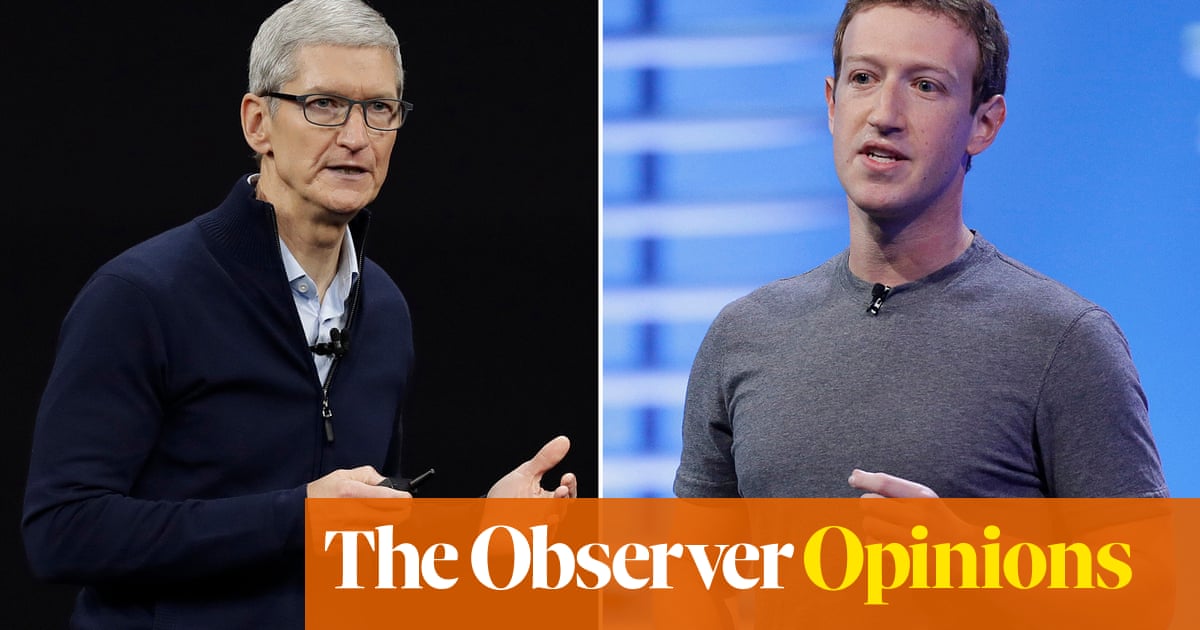
Hypocrisy,” wrote Somerset Maugham, “is the most difficult and nerve-racking vice that any man can pursue; it needs an unceasing vigilance and a rare detachment of spirit. It cannot, like adultery or gluttony, be practised at spare moments; it is a whole-time job.” It is indeed, which is why many corporate leaders sometimes seem to struggle to find time for their day jobs – being chief executives.
Here for example is Mark Zuckerberg the other day on a regular call with stock market analysts. “Our goal,” he declared, “is to give every individual entrepreneur and small business access to the same kinds of tools that historically only the big companies have had access to. One of the things I’m most proud of is that we build the tools so we can offer these same capabilities to small businesses, often for free. So when you hear people say that we hold a lot of data, that’s because hundreds of millions of businesses that would have otherwise had to do this individually and would have had no easy way of doing so are now using our services to help them reach customers. When you hear people say that we’re connecting data from lots of sources, that’s to help small businesses reach customers more efficiently.”
Awww, shucks. Facebook holds gazillions of exabytes of data just so that it can help mom-and-pop businesses. Who knew? But now here’s Tim Cook, the boss of Apple, who doesn’t buy it. In his speech to this year’s Computers, Privacy and Data Protection conference on 28 January, he said that “At a moment of rampant disinformation and conspiracy theories juiced by algorithms, we can no longer turn a blind eye to a theory of technology that says all engagement is good engagement – the longer the better – and all with the goal of collecting as much data as possible. Too many are still asking the question, ‘How much can we get away with?’, when they need to be asking, ‘What are the consequences?’ What are the consequences of not just tolerating, but rewarding content that undermines public trust in life-saving vaccinations?”
Cook doesn’t mention Facebook or Google, of course, though they are the companies he has in mind. But hang on – doesn’t Apple accept between $8bn and $12bn a year from Google for the privilege of making Google the default search engine on iPhones and iPads? In other words, as Ben Thompson points out in his Stratechery newsletter, accepting “money that is derived from the exact sort of advertising practices that Cook is decrying in his speech.”
And so it goes on. Zuckerberg (who owns WhatsApp) ranted about “competitors who make claims about privacy that are often misleading”. Which competitors? Ah: Apple, whose “iMessage stores non-end-to-end encrypted backups of your messages by default unless you disable iCloud, so Apple and governments have the ability to access most people’s messages. So when it comes to what matters most – protecting people’s messages, I think that WhatsApp is clearly superior.” Which seems odd given the recent exodus from WhatsApp since Facebook announced some changes in the way data would be handled in future. Cook retorts by pointing out the way he stood up to the FBI after the 2015 San Bernardino shootings.
These kinds of exchanges have become par for the tech course as public unease about the companies’ power has grown. In that context, the self-serving guff that senior executives routinely exhale looks awfully like hypocritical cant. Zuckerberg and Cook may well not be hypocrites for all I know, but viewing them through that moralistic lens is counterproductive: it directs our attention on to their personalities rather than on to the giant corporations that they run. And it is those corporations that lie at the root of our problems with digital technology.
A few years ago, during a period when there was much heated anxiety about “superintelligence” and the prospects for humanity in a world dominated by machines, the political theorist David Runciman gently pointed out that we have been living under superintelligent AIs for a couple of centuries. They’re called corporations: sociopathic, socio-technical machines that remorselessly try to achieve whatever purpose has been set for them, which in our day is to “maximise shareholder value”. Or, as Milton Friedman succinctly put it: “The only corporate social responsibility a company has is to maximise its profits.”
Given that, it doesn’t really matter whether those who sit at the top of giant tech corporations are saints, sinners or merely liars and hypocrites. Facebook could be staffed entirely by clones of St Francis of Assisi and it would still be a toxic organisation, relentlessly pushing to achieve the purpose assigned to it by Professor Friedman. So if we want to make things better, our focus has to be changing the machine’s purpose and obligations, not on trying to persuading its helmsman to attend to the better angels of his nature.
What I’m reading
John Naughton’s recommendations
Home comforts
An Airbnb Listing Written by My Mom to Me is a lovely spoof by Jenny Crowley on McSweeney’s.
Fake views
Great essay in NOEMA by philosopher Onora O’Neill on why the age of the cyber romantics is coming to an end.
Irresponsible adult
Nowhere in the US constitution are idiots disbarred from being members of Congress. Who knew? Nice Politico column by Jack Shafer.
February 07, 2021 at 07:03AM
https://www.theguardian.com/commentisfree/2021/feb/06/mark-zuckerberg-tim-cook-facebook-apple-problem
Forget Zuckerberg and Cook's hypocrisy – it's their companies that are the real problem - The Guardian
https://news.google.com/search?q=forget&hl=en-US&gl=US&ceid=US:en

No comments:
Post a Comment